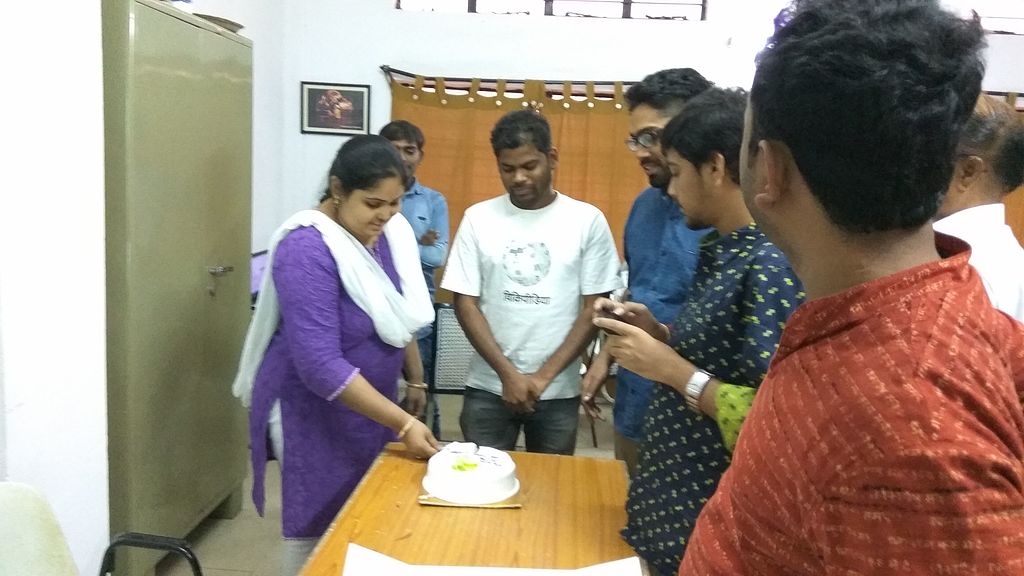Meet Telugu Wikipedian Surampudi Meena Gayathri – the first South Indian Wikiwoman completing 100Wikidays Challenge
-
Access to Knowledge

Ting-Yi Chang
23 January 2017
Ms. MeenaGayathri is an active Telugu Wikipedian who started her 100Wikidays challenge at the end of August 2016. Hermotivation came from the support of her family, the satisfaction of creatingarticles, and her determination to be an inspiration for her fellow Wikipedians. Ms. Meena Gayathri had chosen topicsfrom her interests, including freedom fighters from Andhra Pradesh, wherein articles were present on English Wikipedia but not in Telugu. “I think thoseare really basic things that Telugu Wikipedia should have but somehow thereisn’t” she said. Meena Gayathri reached out to the Telugu communityfor assistance with MediaWiki’s content translation tools. She also had the support of CIS A2K for books and reference resources. Drawing inspiration from current events and Indian culture, Meena Gayathri also wrote articles on Hindu Goddesses on each the ten days of Dussehra in coordination with the worshiping of a different Goddess on each day of the festival.
The creation of articles on Hindu Goddesses also mark Meena Gayathri’s effort and passion in bridgingthe Wikipedia gender gap in content coverage. Half way through her challenge, incoordination with the Wikipedia Asian Month in November 2016, she started writingon biographies of Asian women, including female politicians in Sri Lanka andPakistan. “It’s very interesting” she said, while mentioning her experience inresearching and writing about these female figures, “(how) these women, under hardsituations… are still securing their positions in the government and in thepolitics… I want to let people see how they gain and sustain their power aswomen.” Additionally, Meena Gayathri pioneered anew challenge called “100Women Wikidays Challenge” in which participants wouldwrite a woman-related article each day in an endeavor to balance the contentgender gap on Wikipedia.
“Peoplesaid to me that I am the first South India female Wikipedian to complete the100WikiDays, and the first in the whole world to take up the 100Women Wikidays.”
Herattempt to complete the 100Women Wikidays challenge, however, stopped a fewdays ago due to the lack of internet connection and time. In fact, this is notthe first time that she has faced such difficulty during the completion of herchallenges. She described how during a family tour outside of the city, she usedto bring a laptop and ensure stable internet connection just so she can wake upas early as possible each day to finish her daily articles for the 100Wikidays.She agrees that women usually seem to be occupied by differentresponsibilities and activities – family, work, and socializing. She was gladthat her family and community have given her full support, materially andmentally, to complete the challenge. When asked about tips on sparing sometime for Wikipedia every day, she answered, “The first thing I do in a day… (isto) plan each and every moment of what I need to do in my day. And I maintain atask list in my mind. I will say, just remind yourself twice or thrice a day,remind yourself what you really want to do and you can make some time for Wiki(pedia)too.”
At the end of our conversation, we asked Gayathri to sharesome advice and encouragement to those who want to take up or are completingthe 100Wikidays (or the 100Women Wikidays) Challenge. She answered withouthesitation, “I will say, don’t feel afraid, that work you want to do is notthat tough after all… It will be satisfying. You are contributing to theknowledge revolution… I think for Telugu, for the online knowledge in ourlinguistic background, this is going to be history. I will tell them ‘We’recreating a history.’”